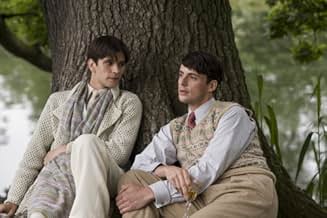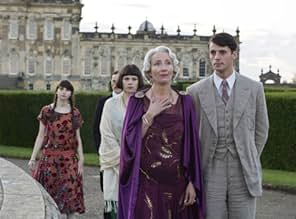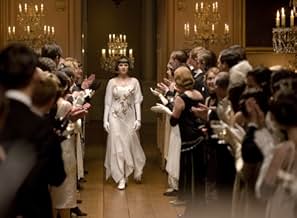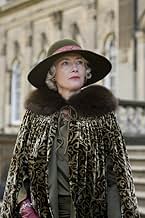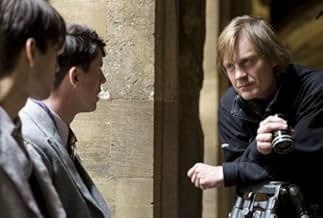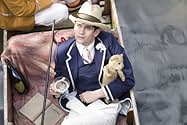IMDb-BEWERTUNG
6,6/10
14.032
IHRE BEWERTUNG
Eine ergreifende Geschichte über verbotene Liebe und den Verlust der Unschuld, die in England vor dem Zweiten Weltkrieg spielt.Eine ergreifende Geschichte über verbotene Liebe und den Verlust der Unschuld, die in England vor dem Zweiten Weltkrieg spielt.Eine ergreifende Geschichte über verbotene Liebe und den Verlust der Unschuld, die in England vor dem Zweiten Weltkrieg spielt.
- Regie
- Drehbuch
- Hauptbesetzung
- Auszeichnungen
- 11 Nominierungen insgesamt
Empfohlene Bewertungen
As with any film which follows a beloved mini-series it is nearly impossible to escape the shadow. When watching this film you'll find yourself constantly comparing it to the mini-series and more often than not the memory of the mini-series comes out ahead.
That being said, I still very much enjoyed the film. As with other recent English remakes (Pride & Prejudice, BBC's Sense & Sensibility) you really appreciate the beauty of modern film making. The cinematography, the score, and the ever beautiful Castle Howard, Venice, and Oxford alone are worth the watching in my opinion. There are also some great performances. Matthew Goode's Charles rivals that of Jeremy Iron's, Hayley Atwell's Julia (in a more central role than that of the mini-series) was also quite good. I also found myself rather enjoying Charles' wife Celia (Anna Madeley) even in such a small role.
The real failure of the film seems to be the difficulty with compressing 11 hours into 2. Everything is forced to move faster and the more quite, gentle, and simple scenes are lost. What's left then is a distillation of the most dramatic moments. As a result the film loses the subtlety of the mini-series. The religious bits are played up a bit too much and makes the characters slightly unbelievable. Emma Thompson is great as always, but her character of Lady Marchmain as written is too over bearing, too controlling, too inhuman. The character of Sebastian is louder than in the mini-series and becomes jaded before you care much for him. Indeed, I didn't find myself caring particularly much for any of the characters except perhaps Charles.
Still, if you don't have 11 hours on hand to spend watching the mini-series, this is a suitable substitute and is worth watching at least once at any rate. As long as you don't go in expecting an equal to the mini-series you'll enjoy it and may even find a moment or two which improves upon the original.
That being said, I still very much enjoyed the film. As with other recent English remakes (Pride & Prejudice, BBC's Sense & Sensibility) you really appreciate the beauty of modern film making. The cinematography, the score, and the ever beautiful Castle Howard, Venice, and Oxford alone are worth the watching in my opinion. There are also some great performances. Matthew Goode's Charles rivals that of Jeremy Iron's, Hayley Atwell's Julia (in a more central role than that of the mini-series) was also quite good. I also found myself rather enjoying Charles' wife Celia (Anna Madeley) even in such a small role.
The real failure of the film seems to be the difficulty with compressing 11 hours into 2. Everything is forced to move faster and the more quite, gentle, and simple scenes are lost. What's left then is a distillation of the most dramatic moments. As a result the film loses the subtlety of the mini-series. The religious bits are played up a bit too much and makes the characters slightly unbelievable. Emma Thompson is great as always, but her character of Lady Marchmain as written is too over bearing, too controlling, too inhuman. The character of Sebastian is louder than in the mini-series and becomes jaded before you care much for him. Indeed, I didn't find myself caring particularly much for any of the characters except perhaps Charles.
Still, if you don't have 11 hours on hand to spend watching the mini-series, this is a suitable substitute and is worth watching at least once at any rate. As long as you don't go in expecting an equal to the mini-series you'll enjoy it and may even find a moment or two which improves upon the original.
Every once in a few decades something like Brideshead comes along. No wonder anyone would want to try to relive that magic! So now there is Brideshead the movie. That means the director had to grasp the original TV show in two hours, so no other choice than a 'The Best Of' compilation remains, it seems.The disadvantage of it is, that what is left out suddenly becomes painfully missing.
All of us who have watched the TV series know it is virtually impossible to surpass it, in film or TV production. Nevertheless, I tried to watch it without prejudice. Overall not a bad movie, but no, not the magical resonance the original had.
All I can do is summarize in details the pluses and minuses of the film versus the TV production so here it goes:
The fathers from original were two of the best actors of the century; John Geilgud (Shakespeare) and the (incomparable) Laurence Olivier. Geilgud plays brilliantly the teasing but not totally indifferent father, who seems stop Charles from the insipid surroundings in the summer but finally lets him go. In the TV series the actor is more serious, and the fun is not there. Laurence had probably one of the best performances of all, and clearly echoes his naughtiness as he portrayed in A Little Romance then a few years earlier. His unpredictability which finally makes him decide for his daughter is well done, especially considered his playground was virtually no more than a static death bed! And then the scene where he is offered a ride in a car down the steps, which he refuses since he doesn't want to admit it might be his last.
Matthew Goode does quite a good job as a substitute of Jeremy Irons. I like especially his ambivalent apparition (homosexual, heterosexual, both, or doesn't it matter?). But he lacks the wonderful narrating voice of Irons, which research has shown to be one of the best around. In the film the romance between Charles and Sebastian's sister is elaborated much more. Partially I agree with this choice. In the original not enough scenes were implanted for credibility, except probably the scene where Charles lights her cigarette. They were virtually strangers meeting again on the cruiser years later and nevertheless they seemed to suddenly hit it off. The sister was not what stood Charles' and Sebastian's friendship in the way. The filmmakers choose for more stress on their impending romance. I think the TV original did this better; it was the family that Charles became part of, and Sebastian's indifference to love that became unsurpassable problems. In original the mother was almost invisible, with the exception of some quotes on her son like 'I don't understand it', which summed it all up. We do not need the dialog in the film where she explains herself, and wonders why her kids hate her. Understatement is much more powerful, also in the scene 'I'll say no more' between Charles and Julia, in which it becomes clear religion has driven them apart. One sentence can be enough.
All this was at the cost of stress Sebastian could have had, and got in the TV original. Most of the magic of Brideshead was simply Anthony Andrews' performance. Worse, the movie clearly alludes to a homosexual relationship, which it did not need to be. Sebastian was a love object, and could be loved by anyone, in any way. But then again, it might be hard finding someone that could deliver the line about Sebastian as Irons narrated: 'his beauty, arresting'. Charm was the problem, the danger. That missed in this film. It was charm that nearly got Charles astray, as told by the queer friend years later in his atelier. The film omitted this important scene, where that friend tried to warn Charles for Sebastian. At the time we all thought it was a nasty remark, but later on he seemed to be right. Or was the charm not an illusion after all? The film simply did not have enough time to build up the charm Sebastian surely had in the TV original. In the TV series Charles was shown first with boring friends, and it then became shortly a coming of age story, where he got introduced in a more fun crowd with Sebastian. This phase delivered some of the best scenes of the story, with his queer friend talking loud over the campus, or Sebastian dressing up as a man with mustache. Sebastian showed Charles other worlds, which real or not, were unforgettable. The film had to rush this too much, and therefore the introduction scene with the spring eggs lost its magic.
One of the few pluses was much less stress on Cordelia, the little girl. But the minus was she acted as an indirect narrator of the importance of religion. Now it had to be compensated for in dialog with the mother and Julia, which was in TV better since there meaning came out of things not said.
Many things I missed, but you can not cram all in two hours. But lines like 'I would like to remember Sebastian, how he were that summer, when we walked through the enchanted place' should have been told again.
The end was nicely done, with Charles finally not pinching candlelight, symbolic for the charm of that family that was still alive in him. I liked there the Irons narrative though 'Was it all vanity? Etc.'
I would say, it was a brave attempt, something like making a remake of 2001, or Casablanca or Breakfast at Tiffany's, and the acting was all well done. Also camera work, and story adaptation. But who can surpass Anthony Andrews, or Jeremy Irons, or Gielgud or Olivier?
All of us who have watched the TV series know it is virtually impossible to surpass it, in film or TV production. Nevertheless, I tried to watch it without prejudice. Overall not a bad movie, but no, not the magical resonance the original had.
All I can do is summarize in details the pluses and minuses of the film versus the TV production so here it goes:
The fathers from original were two of the best actors of the century; John Geilgud (Shakespeare) and the (incomparable) Laurence Olivier. Geilgud plays brilliantly the teasing but not totally indifferent father, who seems stop Charles from the insipid surroundings in the summer but finally lets him go. In the TV series the actor is more serious, and the fun is not there. Laurence had probably one of the best performances of all, and clearly echoes his naughtiness as he portrayed in A Little Romance then a few years earlier. His unpredictability which finally makes him decide for his daughter is well done, especially considered his playground was virtually no more than a static death bed! And then the scene where he is offered a ride in a car down the steps, which he refuses since he doesn't want to admit it might be his last.
Matthew Goode does quite a good job as a substitute of Jeremy Irons. I like especially his ambivalent apparition (homosexual, heterosexual, both, or doesn't it matter?). But he lacks the wonderful narrating voice of Irons, which research has shown to be one of the best around. In the film the romance between Charles and Sebastian's sister is elaborated much more. Partially I agree with this choice. In the original not enough scenes were implanted for credibility, except probably the scene where Charles lights her cigarette. They were virtually strangers meeting again on the cruiser years later and nevertheless they seemed to suddenly hit it off. The sister was not what stood Charles' and Sebastian's friendship in the way. The filmmakers choose for more stress on their impending romance. I think the TV original did this better; it was the family that Charles became part of, and Sebastian's indifference to love that became unsurpassable problems. In original the mother was almost invisible, with the exception of some quotes on her son like 'I don't understand it', which summed it all up. We do not need the dialog in the film where she explains herself, and wonders why her kids hate her. Understatement is much more powerful, also in the scene 'I'll say no more' between Charles and Julia, in which it becomes clear religion has driven them apart. One sentence can be enough.
All this was at the cost of stress Sebastian could have had, and got in the TV original. Most of the magic of Brideshead was simply Anthony Andrews' performance. Worse, the movie clearly alludes to a homosexual relationship, which it did not need to be. Sebastian was a love object, and could be loved by anyone, in any way. But then again, it might be hard finding someone that could deliver the line about Sebastian as Irons narrated: 'his beauty, arresting'. Charm was the problem, the danger. That missed in this film. It was charm that nearly got Charles astray, as told by the queer friend years later in his atelier. The film omitted this important scene, where that friend tried to warn Charles for Sebastian. At the time we all thought it was a nasty remark, but later on he seemed to be right. Or was the charm not an illusion after all? The film simply did not have enough time to build up the charm Sebastian surely had in the TV original. In the TV series Charles was shown first with boring friends, and it then became shortly a coming of age story, where he got introduced in a more fun crowd with Sebastian. This phase delivered some of the best scenes of the story, with his queer friend talking loud over the campus, or Sebastian dressing up as a man with mustache. Sebastian showed Charles other worlds, which real or not, were unforgettable. The film had to rush this too much, and therefore the introduction scene with the spring eggs lost its magic.
One of the few pluses was much less stress on Cordelia, the little girl. But the minus was she acted as an indirect narrator of the importance of religion. Now it had to be compensated for in dialog with the mother and Julia, which was in TV better since there meaning came out of things not said.
Many things I missed, but you can not cram all in two hours. But lines like 'I would like to remember Sebastian, how he were that summer, when we walked through the enchanted place' should have been told again.
The end was nicely done, with Charles finally not pinching candlelight, symbolic for the charm of that family that was still alive in him. I liked there the Irons narrative though 'Was it all vanity? Etc.'
I would say, it was a brave attempt, something like making a remake of 2001, or Casablanca or Breakfast at Tiffany's, and the acting was all well done. Also camera work, and story adaptation. But who can surpass Anthony Andrews, or Jeremy Irons, or Gielgud or Olivier?
The greatness of the original Brideshead Revisited was in the luxury of being able to transpose a very complicated emotional and intellectual book into words. It succeeded in this, but only just, due to superb direction, photography and script which, even in its sparseness, only just allowed the successful transition to film. The problem with anything shorter is that, if it took Mortimer so many episodes to get it right, then there are very few writers who could even get near in under 4 hours, if that. So lets stop beating about the bush. This is a sound reproduction of the calender plot but after that it is not Brideshead Revisited. Call it by another name and I will laud it. It brings in a strong homosexual element and a early sexual attraction between Charles Ryder and Miss Flyte. With that everything becomes unbalanced. Motivations change. The beauty of the original is that it hinted at ????something (a je ne sais quoi) and it was that and the ever strengthening Catholic awareness of family that made this film so fascinating. The original's masterpiece was the script supported by the cine photography. That has been lost. But taken as is, a pretty and interesting film which seems to be loosely based on an early fifties work by Waugh.
Among many of the most prestigious literature selections, not to mention mini-series, Brideshead Revisited not only wasn't on my radar, I didn't even know if it would be the kind of well-regarded literature or mini-series I intended to watch. But as this newly revised picture, now a mere 136 minutes vs 10 hours, it looked interesting if only as a kind of "handsomely made" picture (you know the kind, along the lines of Atonement for recent comparison). I was also intrigued by the allure of a huge, sprawling mansion here called Brideshead, as it reminded me of Alain Resnais's film Last Year at Marienbad and how memories and recollections and lost love and hope is explored in the spaces of this dark, cold region of exquisite luxury. Some of that is explored in this film, and some of it... isn't.
It's for the most part a fairly tragic story of a young man, Charles (Matthew Goode, charming and suave but also subtle and down-beat, a really fine turn), who enrolls at Oxford and meets a meek/'fey' guy named Sebastian, and through him he's introduced (reluctantly in point of fact) to Sebastian's family, including his sister Julia, and his very cold and strident mother (Emma Thompson). Sebastian really wants Charles all for himself - it's a friendship that goes just a nose-hair's length into admitting homosexuality but never really goes that far despite all appearances to the contrary - but he becomes apart of the fold, and as well falling deeply in love with Julia against 'other' wishes (mostly the matriarch's over Charles's religion).
There's a lot of the fragility of the bourgeois on display here, the arrogance and detachment that's shown very closely by the director for maximum effect. Unlike a Resnais he's not about to get too experimental with the camera; he's a careful craftsman more often than not, allowing for just enough wonderment of the whole Brideshead atmosphere to really sink into how it could be a double-edged sword of perception. And as is bound to happen with material this sprawling (at one point time jumps back 10 years, then ahead 4 years, until we kind of know where we are), a lot seems to be cut out. While it altogether makes a coherent and entertaining enough picture, I wonder how much more of a benefit this would make as an epic, where we are absorbed more fully with the Oxford school or Charles and Sebastian or even the parents (who, thankfully, are played wonderfully here by cold-as-ice Thompson and fascinatingly guilt-ridden and subtle Michael Gambon), or how the wealth structure even works here.
Indeed, I found myself not so much involved with the Charles/Sebastian stuff, even as it's fairly well-acted and well-shot enough, as I was with the themes of religion raised in the picture. This caught me off guard and hinted at something deeper being expounded upon. Yet, again, we get just tastes of what's offered more than likely in the original text, tastes that are powerful like a 'last-rites' argument, and the tortured state of being raised from the cradle with an intense, overbearing Catholic conscience.
It's for the most part a fairly tragic story of a young man, Charles (Matthew Goode, charming and suave but also subtle and down-beat, a really fine turn), who enrolls at Oxford and meets a meek/'fey' guy named Sebastian, and through him he's introduced (reluctantly in point of fact) to Sebastian's family, including his sister Julia, and his very cold and strident mother (Emma Thompson). Sebastian really wants Charles all for himself - it's a friendship that goes just a nose-hair's length into admitting homosexuality but never really goes that far despite all appearances to the contrary - but he becomes apart of the fold, and as well falling deeply in love with Julia against 'other' wishes (mostly the matriarch's over Charles's religion).
There's a lot of the fragility of the bourgeois on display here, the arrogance and detachment that's shown very closely by the director for maximum effect. Unlike a Resnais he's not about to get too experimental with the camera; he's a careful craftsman more often than not, allowing for just enough wonderment of the whole Brideshead atmosphere to really sink into how it could be a double-edged sword of perception. And as is bound to happen with material this sprawling (at one point time jumps back 10 years, then ahead 4 years, until we kind of know where we are), a lot seems to be cut out. While it altogether makes a coherent and entertaining enough picture, I wonder how much more of a benefit this would make as an epic, where we are absorbed more fully with the Oxford school or Charles and Sebastian or even the parents (who, thankfully, are played wonderfully here by cold-as-ice Thompson and fascinatingly guilt-ridden and subtle Michael Gambon), or how the wealth structure even works here.
Indeed, I found myself not so much involved with the Charles/Sebastian stuff, even as it's fairly well-acted and well-shot enough, as I was with the themes of religion raised in the picture. This caught me off guard and hinted at something deeper being expounded upon. Yet, again, we get just tastes of what's offered more than likely in the original text, tastes that are powerful like a 'last-rites' argument, and the tortured state of being raised from the cradle with an intense, overbearing Catholic conscience.
I haven't read Evelyn Waugh's famous 1945 novel or seen Granada's acclaimed 1981 television adaptation. so I approached the story fresh, as indeed will most viewers of this quintessentially England tale of the repressive nature of religion and class. I understand that the adaptation by Andrew Davies and Jeremy Brock has taken some liberties with the original, more subtle narrative, but this is inevitable in a work of just 133 minutes compared to the 11 episodes of the television series.
Directed by the English Julian Jarrold who made "Becoming Jane", the film has many strengths. There are wonderful locations in Oxford, Venice, Morocco and above all Castle Howard in North Yorkshire standing in - as in the television version - as the eponymous country house that is almost a character in itself. The script contains some fine lines - often very cutting and very cruel. Above all, there is some accomplished acting, both from veterans Michael Gambon and Emma Thompson as Lord and Lady Marchmain and newcomers Ben Whishaw and Hayley Attwell as their son Sebastian and daughter Julia and Matthew Goode as Charles Ryder, a young artist who falls in love in different ways with both Sebastian and Julia as well as their home and style.
Sadly, however, ultimately the whole film seems somewhat pedestrian and leaves one feeling strangely cold and disconnected.
Directed by the English Julian Jarrold who made "Becoming Jane", the film has many strengths. There are wonderful locations in Oxford, Venice, Morocco and above all Castle Howard in North Yorkshire standing in - as in the television version - as the eponymous country house that is almost a character in itself. The script contains some fine lines - often very cutting and very cruel. Above all, there is some accomplished acting, both from veterans Michael Gambon and Emma Thompson as Lord and Lady Marchmain and newcomers Ben Whishaw and Hayley Attwell as their son Sebastian and daughter Julia and Matthew Goode as Charles Ryder, a young artist who falls in love in different ways with both Sebastian and Julia as well as their home and style.
Sadly, however, ultimately the whole film seems somewhat pedestrian and leaves one feeling strangely cold and disconnected.
Wusstest du schon
- WissenswertesDame Emma Thompson threatened to quit this movie if the producers persisted in pushing actress Hayley Atwell to lose weight. Atwell said that Harvey Weinstein even insulted her over lunch by saying: "You look like a fat pig on-screen. Stop eating so much."
- PatzerAfter the dinner, at which Charles first meets Lady Marchmain, the family go to pray in the private chapel. The ladies, as Roman Catholics, would have covered their heads with a scarf or a veil.
- Zitate
Sebastian Flyte: I asked too much of you. I knew it all along, really. Only God can give you that sort of love.
Top-Auswahl
Melde dich zum Bewerten an und greife auf die Watchlist für personalisierte Empfehlungen zu.
Details
- Erscheinungsdatum
- Herkunftsländer
- Offizieller Standort
- Sprachen
- Auch bekannt als
- Brideshead Revisited
- Drehorte
- Produktionsfirmen
- Weitere beteiligte Unternehmen bei IMDbPro anzeigen
Box Office
- Budget
- 20.000.000 $ (geschätzt)
- Bruttoertrag in den USA und Kanada
- 6.432.256 $
- Eröffnungswochenende in den USA und in Kanada
- 339.616 $
- 27. Juli 2008
- Weltweiter Bruttoertrag
- 13.451.186 $
- Laufzeit
- 2 Std. 14 Min.(134 min)
- Farbe
- Sound-Mix
- Seitenverhältnis
- 2.35 : 1
Zu dieser Seite beitragen
Bearbeitung vorschlagen oder fehlenden Inhalt hinzufügen


